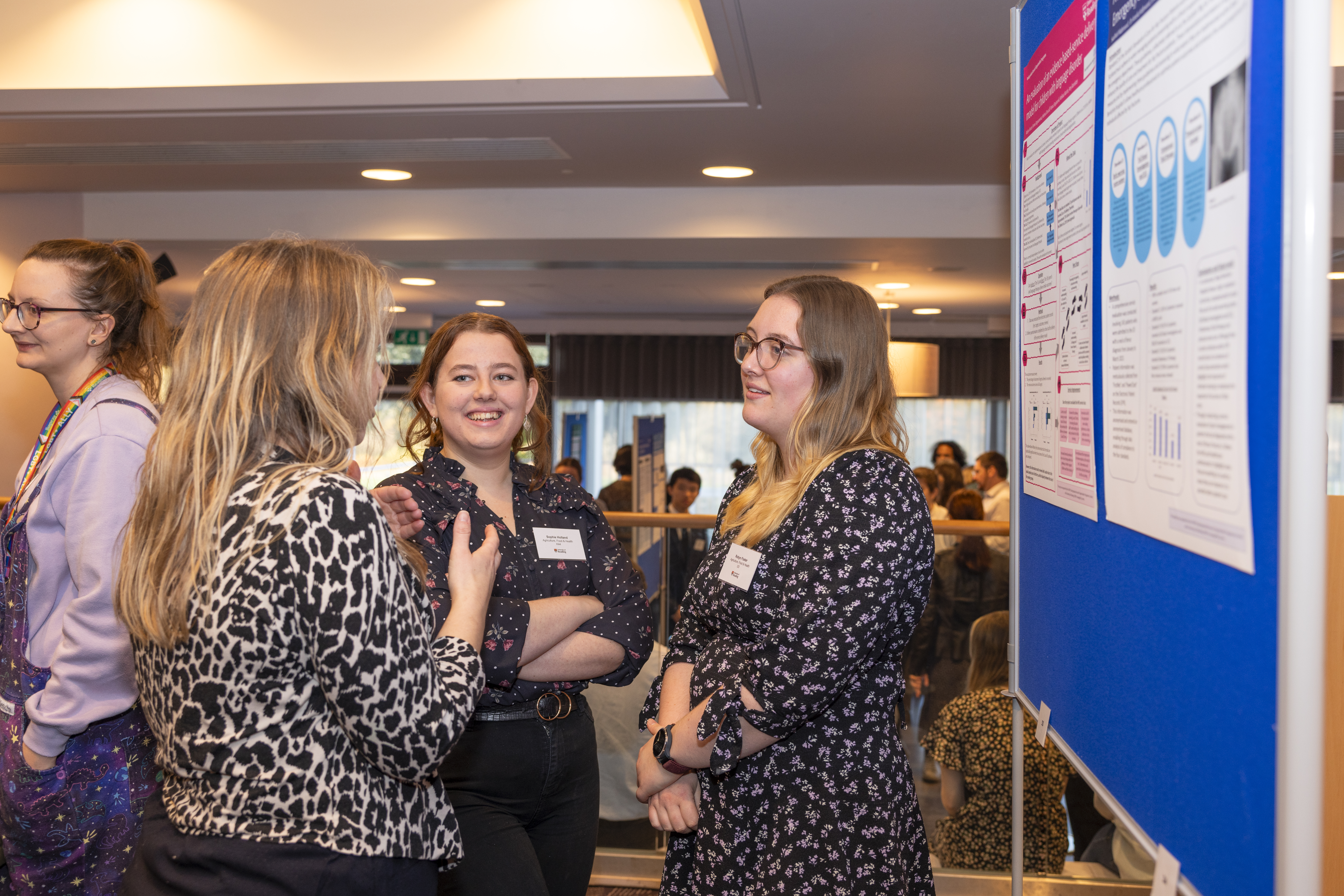The Undergraduate Research Opportunities Programme (UROP) offers students at the University of Reading the chance to gain hands-on research experience across all disciplines.
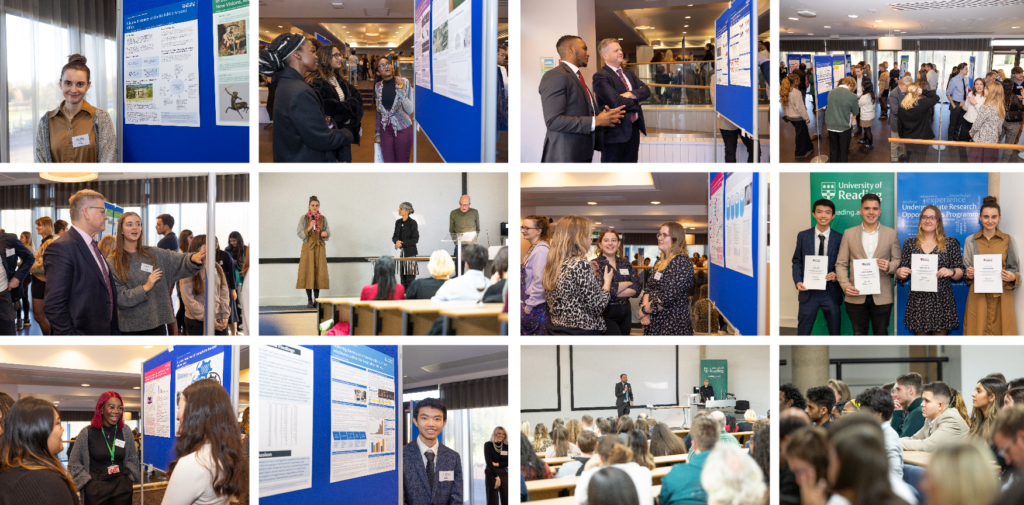
Every November, UROP holds a showcase event for participants, and winners are announced for each research theme. In this blog, the 2023 winners and their supervisors reflect on the benefits of the programme.
Agriculture, Food & Health: Robyn Foster
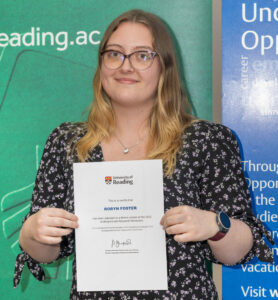
Overall, the project was an amazing learning opportunity, which has ignited a passion for research I didn’t know I had. I loved the hands-on nature of the project, and interacting with real-world clients and data will be an invaluable asset going forwards into my professional career. The project would not have been possible without my supervisors, and I am immensely grateful for the opportunity and their ongoing and unwavering support.
Robyn is in the third year of an MSci in Speech and Language Therapy. Her project was: Evaluating the effectiveness of an evidence-based service delivery model for school-aged children with language disorder: a UoR and NHS collaboration.
The project looked to evaluate service delivery of a new evidence-based delivery model in children with language disorder within Buckinghamshire. Before this project, there was only very limited research regarding the model’s effectiveness. The project aimed to assess the effectiveness of the approach, and if the children were receiving it were benefiting. We highlighted some misalignments and misunderstanding within the data collection, which led to changes to the delivery method, to further increase the effectiveness of the model going forwards. With these changes (which Buckinghamshire NHS Trust have already begun to implement), a further iteration of the study can be completed to ascertain the full effectiveness of this model of service delivery for the children involved.
Robyn’s supervisor, Emma Pagnamenta, Associate Professor in the School of Psychology and Clinical Language Sciences, said:
The programme and this project in particular has facilitated a very successful collaboration between the University and Buckinghamshire NHS Trust. The project has provided many crucial insights on quality improvement for the NHS team that would not have been identified without the capacity provided by UROP. Importantly, due to the nature of this project, the findings are already bringing about changes that will impact directly on outcomes for children with language disorder. Through Robyn’s exceptional work, sharing the project at the British Undergraduate Conference and the Posters in Parliament event will help raise the profile of speech and language therapy at a national level. We are continuing to work with Buckinghamshire NHS Trust on wider dissemination of this work and future collaborations.
Robyn’s co-supervisor, Vesna Stojanovik, Professor of Clinical Linguistics, said:
I have very much enjoyed the collaboration with our internal team and with the external partner, Buckinghamshire NHS Trust. I found it very rewarding to be able to share my research knowledge and experience to support the training of an undergraduate student and also to support important work of a service which will have positive implications for the provision of the speech and language therapy to children and young people.
Heritage & Creativity: Magda Adkins
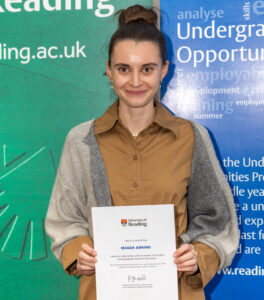
Working on the UROP project over the summer was a wonderful experience and allowed me to pursue research in an area that I am passionate about. Knowing that I am eager to pursue a career in the heritage sector and community engagement, I feel that the experience I gained on the project has given me transferable skills I can bring with me into the professional sector. My time on the UROP enhanced my critical thinking and communication skills, leaving me feeling more confident about approaching big projects in my final year of study. Additionally, the privilege of presenting my research at both the showcase and another event contributed significantly to my proficiency in delivering impactful presentations to non-specialist audiences.
Magda is studying for a BA in Museum Studies and Archaeology. Her project was: Diverse Histories at the Berkshire Record Office.
Diverse Histories at the Berkshire Record Office (now Royal Berkshire Archives) was centred around using archival research to identify the presence of individuals of ethnic minority heritage in Berkshire in the eighteenth and nineteenth centuries. At the heart of the research was really addressing the existence of these gaps in knowledge about the lives and experiences of ethnic minority populations in the heritage narrative of Berkshire. The exclusion of certain groups of people from narratives of the past reinforces authorised heritage discourses and further marginalises contemporary populations in society today. The research that we undertook challenged the common misconception of migration being a post WWII phenomenon and showed that small pockets of people of ethnically diverse backgrounds did live in rural Berkshire in pre-Victorian times.
One of the other major aims of the project was to evaluate its potential to evolve into a community-led initiative. After our research in the archives and the Museum of English Rural life library we spoke to several professionals from different sectors to ask about best practices for facilitating engagement with community groups. The responses we received confirmed that the best way to take the project forward would be as a participatory project led by community voices.
Magda’s supervisor, Richard Blakemore, Associate Professor of Social and Maritime History, said:
It was a great pleasure to supervise this UROP project. The two students working with us, Magda and Charlie, made a great team and did an excellent job with archival research and their interviews. It was particularly interesting and useful to hear their own ideas and reflections developing out of these activities. Their research has played a crucial role in the early stages of this collaboration with the Royal Berkshire Archives, and will really improve the next steps we take with this project. We are very grateful to Magda and Charlie for their work with us!
Environment: Juan Rodriguez
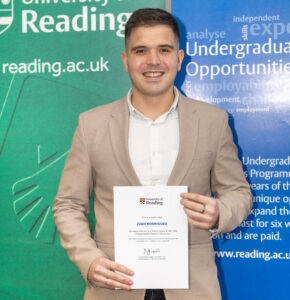
Being part of the Undergraduate Research Opportunity Programme has been a highly enriching experience. When I began, I was worried about the amount of new content I needed to learn to become familiar with the research topic. However, I realised I was not expected to know everything before starting. Instead, I was encouraged to research along the way and develop a critical approach to thinking about a new area of study. Now that I have completed my internship, I feel more confident in conducting research independently and handling large sets of data. I have also learned that sometimes stepping out of your comfort zone to experience something unknown can be crucial for your professional future. I would definitely recommend UROP to any student looking to enrich their university learning experience.
Juan is studying for a BEng in Architectural Engineering. His project was: Spectral signatures of the solar irradiance within the tree canopy shade.
In recent years, remote sensing has played a vital role in identifying and mapping vegetation to assess ecosystem services, plant health, and canopy structure. A diverse array of sensors and platforms, including satellites, Unmanned Aerial Vehicles, and Lidars (Light Detection and Ranging), have been systematically employed for monitoring. However, challenges emerge in sparse conditions, like semi-arid forests or urban areas, where mixed pixels introduce biases in signal interpretation. Sparse canopies, unlike dense forests, require consideration of multiple components within a pixel, such as shadows, often neglected in remote sensing research.
This study draws on data from the 2019 InfruTreeCity project, investigating the interaction between urban trees and the built environment. At Hall Farm, University of Reading, seven containerised urban trees were strategically placed in a controlled microenvironment. Spectrometric measurements were taken above the canopy and within the tree shade, alongside surface temperature and canopy-reflected irradiance measurements. The research focuses on exploring the spectral signature of solar irradiance within the shade, aiming to unlock its potential use in understanding canopy biophysical or chemical characteristics. This investigation focuses on the complexities of remote sensing applications in diverse environmental settings, underscoring the importance of sophisticated approaches in interpreting spectral information, especially in areas with low-density tree canopies.
Juan’s supervisor, Stefán Smith, Professor of Energy Systems and the Built Environment, said:
A student like Juan can really help to progress understanding/thinking in relation to a research task or question, which can be super valuable when dealing with time pressures associated with research. Giving curious students the opportunity to gain insight into research and give a more rounded perspective of what an academic role entails helps in the training/recruitment of the next generation of researchers and academics. Indeed, the first UROP I was involved in (about 9 years ago), the student in question went on to do a PhD at Reading.
Prosperity & Resilience: Lucas Shea
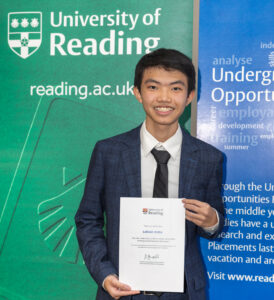
The UROP scheme has been an amazing chance to explore something completely different from my normal syllabus. From someone with virtually no experience in programming or data analytics half a year ago, I have not only used this chance to develop my own interest in data analytics but foster professional research relationships that will last a lifetime.
Lucas is studying for a BSc in Accounting and Finance. His project was: Exploring the impact of service robots as frontline employees within the hospitality industry.
My UROP project involved exploring the impact of service robots within the hospitality industry using online review analytics to compare hotels that have incorporated service robots within their operations to hotels that have not.
Since the start of the COVID-19 pandemic, the use of service robots within the hospitality sector has grown rapidly due to an increased need for reduced human-to-human contact as per pandemic guidelines.
As such, this project aimed to establish the framework for ensuring comparability between hotels utilising robots and hotels that do not, exploring the usage of online review data to conduct research, and using statistical analysis to critically analyse data collected.
Overall, we found that hotels utilising robots were rated marginally higher than hotels that did not. However, this difference was not statistically significant. Therefore, one could conclude that since having robots provide equivalent service to humans, the economies of scale that robots could provide means that hotels may be incentivised to incorporate robot employees within their operations.
Lucas’s supervisor, Matteo Borghi, Lecturer in Entrepreneurship & Innovation, said:
The UROP scheme has been invaluable to my research journey, providing a platform to engage with a highly committed student, passionate about our project. As an early career researcher, the experience of selecting a candidate through interviews allowed me to reflect on the importance and design of my work. This opportunity served as a pilot project for my research, enhancing our department’s awareness and fostering collaboration with exceptional talent. Nurturing these future researchers aligns with my objective of continued collaboration and mentorship.
Find out more about the Undergraduate Research Opportunities Programme (UROP).

